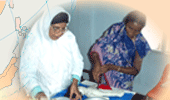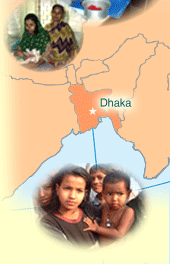
PRIME II’s work in Bangladesh focused on assistance to large-scale training programs to help public- and private-sector primary providers implement essential services at the community level.
Health and Population Sector Program
In 2000, USAID/Bangladesh asked PRIME II to assist the Ministry of Health and Family Welfare’s Technical Training Unit (TTU) in implementing a national in-service training strategy developed by the Government of Bangladesh’s Health and Population Sector Program (HPSP) with help from PRIME. Conducted by Lead Training Organizations—government institutions and NGOs—the in-service training prepared primary providers to deliver an Essential Services Package (ESP) consisting of reproductive health, child health, communicable disease control, limited curative care and behavior change communication. A PRIME team worked with the TTU to develop a comprehensive planning, monitoring and evaluation process (including baseline and end-term surveys and a training management information system) and to establish national training standards and guidelines. In addition to strengthening the TTU’s training management capacity, PRIME helped the Lead Training Organizations to assess and strengthen their performance in developing curricula and planning, conducting and documenting training. PRIME introduced the Performance Improvement methodology to the Lead Training Organizations and also applied transfer of learning and supportive supervision approaches.
Key Results: Between May 2000 and July 2003, the program trained 45,035 health and family planning personnel in the basic ESP. The training management information system reported that 65% of training courses were managed to standard, with 80% of trainers performing to standard in the classroom and 50% in clinical training. An evaluation found all of the LTOs meeting the quality standards established in the national training standards, and the percentage of trainees with acceptable scores (84% or higher) on a performance observation chedklist rose from 4% at baseline to 61% post-training (n=34,309) and 37% for a sample of 302 providers at follow-up.
National Integrated Population and Health Program
PRIME II helped to increase capacity for implementing the ESP at private-sector primary health care facilities through assistance to the USAID National Integrated Population and Health Program (NIPHP). The program trained 1,528 paramedics and doctors to deliver an expanded array of family planning, reproductive health and child survival services, increasing the accessibility and quality of these services for many thousands of Bangladeshis. PRIME developed training materials and curricula, helped trainers improve their skills, and generally strengthened the training and management capacity of ten Dhaka-based training organizations (primarily service delivery-oriented NGOs).
Key Results: A training effects study of 124 trained paramedics and 15 untrained paramedics found that 96% of the trained providers possessed adequate knowledge in maternal health and STIs/reproductive tract infections compared with 62% of untrained; 64% had adequate knowledge in child survival interventions as opposed to 24% of untrained. A follow-up of 74 paramedics trained in maternal health and STIs/reproductive tract infections found all of them performing to standard; 81% of 52 trained paramedics followed-up in child survival interventions were performing to standard. Use of clinic services increased dramatically at facilities with trained providers, rising from an average of 61 monthly clients to 299 per month at 30 months post-training.
|











